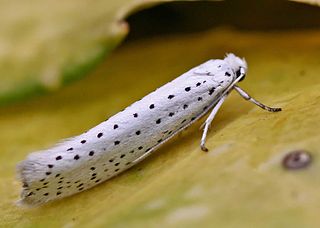
The family Yponomeutidae are known as the ermine moths, with several hundred species, most of them in the tropics. The larvae tend to form communal webs, and some are minor pests in agriculture, forestry, and horticulture. Adult moths are minor pollinators.

Yponomeutoidea is a superfamily of ermine moths and relatives. There are about 1,800 species of Yponomeutoids worldwide, most of them known to come from temperate regions. This superfamily is one of the earliest groups to evolve external feeding and to colonize herbs in addition to shrubs and trees.

The Lacturidae comprise a family of moths in the superfamily Zygaenoidea. Brightly coloured tropical moths, the Lacturidae have been previously placed in the Plutellidae, Yponomeutidae, and Hyponomeutidae.
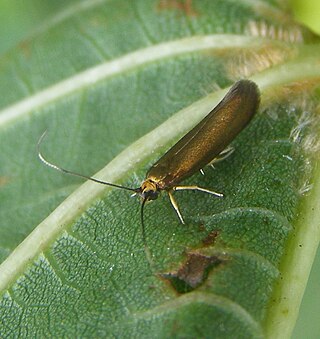
Roeslerstammiidae is a family of insects in the order Lepidoptera. The family arose from the taxonomic uncertainty of the genus Roeslerstammia Zeller, 1839, which was assigned to different families. The genus Roeslerstammia was removed from the Yponomeutidae Stephens, 1829, and placed in the Amphitheridae Meyrick, 1913, which in consequence became a junior synonym of Roeslerstammiidae. Consequently, Roeslerstammiidae comprises the Palearctic genus Roeslerstammia, as well as the Oriental and Australasian genera that form part of the Amphitheridae.

Veronica polita, or grey field-speedwell, is a herbaceous flowering plant species in the plantain family Plantaginaceae. It has hairy stems, is either prostrate or ascending, with dull green leaves that are one of petiolate, serrate, ovate (rounded) and usually wider than long.The flowers are small and bright blue. The plant has solitary axillary peduncles that are shorter or slightly longer than the leaves. It is native to Eurasia, possibly including the British Isles, western Asia, northern Africa, and North America, but has been introduced into suitable habitats worldwide as a weed of cultivation. It is susceptible to downy mildew disease caused by the oomycete species Peronospora agrestis.
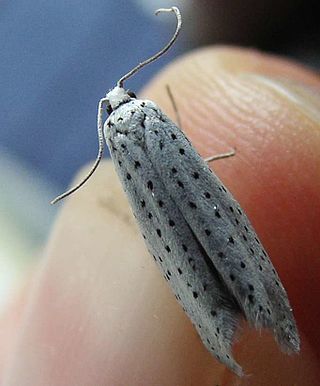
Yponomeutinae is a subfamily of "micromoths" in the lepidopteran family Yponomeutidae. As their scientific name implies, this is the subfamily containing the type genus of the ermine moths, Yponomeuta. The subfamily has worldwide distribution.

Polita Grau was the First Lady of Cuba, a Cuban political prisoner, and the "godmother" of Operation Peter Pan, also known as Operación Pedro Pan, a program to help children leave Cuba. Operation Peter Pan involved the Roman Catholic Church and Monsignor Bryan O. Walsh from 1960 to 1962, which were involved in encouraging Cuban parents to send their children to live with U.S families to rescue them from Communism.
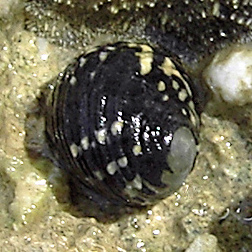
Nerita is a genus of medium-sized to small sea snails with a gill and an operculum, marine gastropod molluscs in the subfamily Neritinae of the family Neritidae, the nerites.
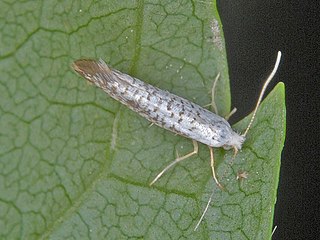
Argyresthia retinella is a species of moth of the family Yponomeutidae.

Eucalantica is a genus of moths of the family Yponomeutidae. Species in the genus are superficially similar to Thecobathra species, which also have a silvery white body and forewings, but differ from the latter in having a dark brown costal streak in forewing.

Kessleria is a genus of moths of the family Yponomeutidae.
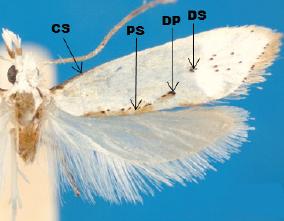
Eucalantica ehecatlella is a moth in the family Yponomeutidae. It is found in Costa Rica.

Eucalantica icarusella is a moth in the family Yponomeutidae. It is found in Costa Rica.
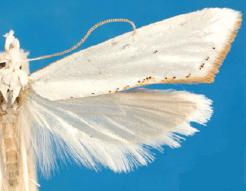
Eucalantica powelli is a moth in the family Yponomeutidae. It is found in Costa Rica.
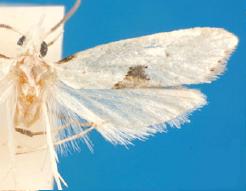
Eucalantica pumila is a moth in the family Yponomeutidae. It is found in Costa Rica.

Eucalantica vaquero is a moth in the family Yponomeutidae. It is found in the United States and Mexico.

Ficus polita, the heart-leaved fig, is a species of fig that is native to forests of tropical Africa,
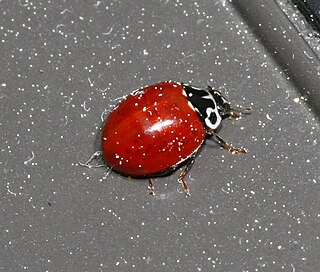
Cycloneda polita, known generally as the western blood-red lady beetle, polished ladybug, or western spotless ladybird beetle, is a species of lady beetle in the family Coccinellidae. It is found in North America. It has red elytra without spots and a black thorax marked with a white rim and crescents.

Hierodoris polita is a species of moth in the family Oecophoridae. It is endemic to New Zealand and is found only in the Central Otago region and in the Dunedin area. As at 2005 the larvae have yet to be identified. However it is possible that a specimen may have been collected in leaf litter thus leading to the hypothesis that the species may be a detritivore. The adults of this species prefer open habitat and have mainly been collected on south-facing rocky bluffs. The adult moths are on the wing in October, November and January to March. This species is classified as "At Risk, Naturally Uncommon" by the Department of Conservation.
Baroil Polita Union is a union parishad situated at Magura Sadar Upazila, in Magura District, Khulna Division of Bangladesh. The union has an area of 28.40 square kilometres (10.97 sq mi) and as of 2001 had a population of 26,784. There are 21 villages and 16 mouzas in the union.














